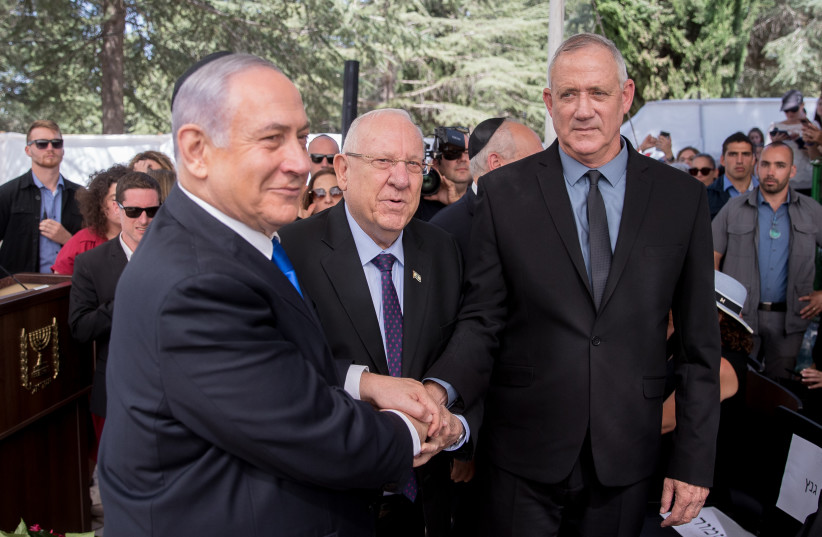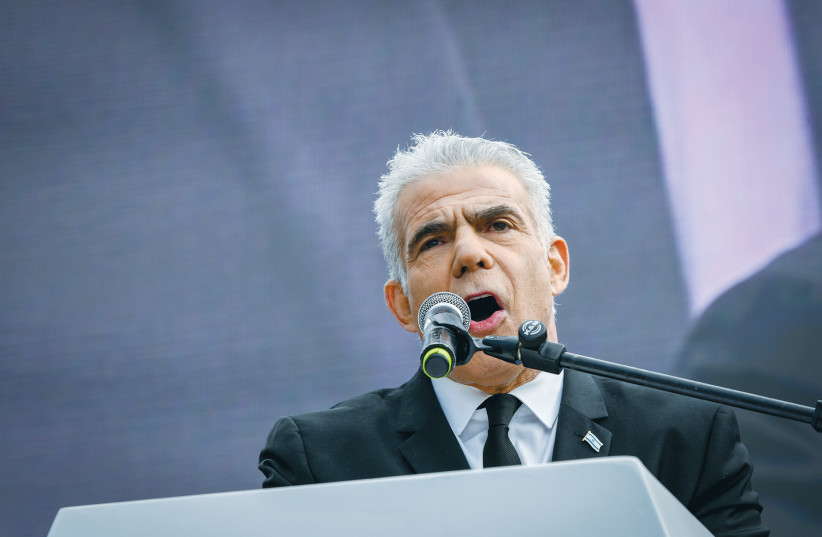Israel's opposition is out of options against judicial reform

The leaders of the mass anti-reform protests, now entering their eighth week, and Center-Left influencers lashed out over the photos in anger and disappointment.
Shortly after midnight on Monday, just as the Knesset was finalizing a noisy six-hour debate over the judicial overhaul and about to proceed to the first votes on the reform that is tearing the country in two, a rare moment of sanity and unity overtook the plenum.
The chairman of the Yesh Atid faction, Boaz Toporovsky, who had been seriously injured in a car accident, made a surprise entrance to the floor after a month of convalescence and absence from the plenum.
Justice Minister Yariv Levin, halfway into a belligerent speech in defense of the controversial reform, halted his barrage of rhetoric as dozens of MKs, from both sides of the political aisle, ceased their mutual shouting to approach the neck-braced Toporovsky and warmly greet him upon his arrival. Even Prime Minister Benjamin Netanyahu rose from his chair to wish him a speedy recovery and welcome him back.
In the midst of one of the most contentious and embattled evenings the Knesset has ever experienced, Toporovsky’s grand entrance generated an unusual reminder of normality and humanity.
Of course it was short-lived. Within minutes, the picture of Netanyahu cuddling up with the opposition, and another one, of Benny Gantz joking with Levin, went viral. Not everyone appreciated the singular moments of grace.
Earlier that day, tens of thousands of demonstrators surrounded the Knesset to cry out against the government’s radical legal shake-up, marking what they deem as a disastrous doomsday for Israel as we know it. Then, later that same evening, minutes before the first readings, their political representatives were caught on camera all merry and cheerful with the so-called villains.
The leaders of the mass anti-reform protests, now entering their eighth week, and Center-Left influencers lashed out over the photos in anger and disappointment.
“We did not smile at Netanyahu, we were happy that Boaz returned to us,” Yesh Atid MK Vladimir Beliak had to clarify on Twitter, while apologizing for the bad optics.
Passing the first milestone
WITH OR WITHOUT the opposition’s smiles, the government passed the first milestone of the judicial restructure this week. Ignoring President Isaac Herzog’s plea to freeze the rapid process for a national dialogue, Levin and the chairman of the Knesset Constitution, Law and Justice Committee, Simcha Rothman, cemented a few of the controversial bills in first and preliminary readings.
So far, the presidential efforts to prevent a political, social and economic collapse have failed to yield any substantial achievement, and have spiraled into a blame game of preconditions. The opposition is demanding to halt the legislation before opening official talks, while the coalition is open to talks – but adamantly refuses to any halt or hiatus.
The morning after the reform reached its first landmark, Herzog once again urged the coalition to pause and adopt his outline for dialogue. Netanyahu once again called out to Lapid – “Let’s talk, here and now,” and once again underscored “without preconditions.”
Lapid once again repeated the mantra and demanded a halt to all legislation. A never-ending loop.
To break the political impasse, Herzog has been trying to foster alternative channels with the coalition, mobilizing prominent rabbis and right-wing opinion-makers to push for compromises from within. Levin and Rothman have both signaled they are open for some changes in the reform, ahead of the second and third readings, which are currently scheduled for the end of March.
But the architects of the judicial overhaul also stressed they will not compromise on its core foundations: cementing the government’s control over the judge selection process and limiting the court’s oversight of its policies and legislation. This means the coalition’s maximum bid of concessions is not likely to meet the minimum the opposition can accept, and probably won’t pacify the protesters, who are wary of any dialogue to begin with.
Meanwhile, the prime minister’s concerns about the demonstrations are increasing, moreover with the swift economic fallout from the political and civil unrest. Netanyahu made a point to repeatedly call on Lapid and Gantz to agree to meet, in a clear effort to calm down markets and interest rates and relieve the growing international anxiety over the speedy changes to Israeli democracy.
But the opposition, at least part of it, insists there will be no talks “under fire” as long as the coalition continues to advance the legislation. The other part, led by Merav Michaeli and Avigdor Liberman, is not even willing to consider negotiations and is pushing for a much more militant approach.
Liberman proposed to stage a collective boycott of the vote on the reform in the plenum on Monday. Lapid and Gantz rejected the move, so the Yisrael Beytenu faction settled for an independent snub. Some of the leaders of the protests, who are also pushing for harsher measures, are now suggesting a drastic concerted resignation of the opposition to assert and affirm its dissent and objection to the government’s plans.
However, senior sources in the opposition downplay the effectiveness of the move.
“According to the law, even if all 56 opposition MKs resign – they are automatically replaced by the next candidates slated on the party lists,” one of them explained, deeming the proposal as “useless and counterproductive.”
No meaningful negotiations in sight
With no meaningful negotiations in sight at the President’s Residence, nor any substantial influence on the course of the legislation in the Knesset, the opposition intends to continue concentrating their efforts in the streets. Netanyahu and his allies are pointing to Lapid and accusing him of purposely leading to a civil war and encouraging the looming economic crisis, and are trying to instigate the opposition’s internal rivalries and divisions and reach out to Gantz; up to now, they haven’t had any success.
In the meantime, with the economy already in turmoil and alarming the markets and pockets of all Israelis, and with the security situation deteriorating, pressure on the government is mounting. There is hope in some circles that Netanyahu will recalculate and try to steer the legislation locomotive in a different way, to, as US Ambassador to Israel Tom Nides suggested, “pump the brakes.”
But Netanyahu’s coalition allies and cronies will not necessarily follow suit and are bound to limit any concessions and moderations he considers making. If indeed the prime minister was to take such a substantial turn, then Lapid, Gantz and the opposition would be facing a new dilemma: whether to save the government from the catastrophe with a compromise or leave it to breakdown by its own disintegration.
But as long as Netanyahu, Levin and Rothman endure with their plans, the opposition has no real cards to play other than binding themselves to the public and civilian protests in the streets.
Jerusalem Post Store
`; document.getElementById("linkPremium").innerHTML = cont; var divWithLink = document.getElementById("premium-link"); if (divWithLink !== null && divWithLink !== 'undefined') { divWithLink.style.border = "solid 1px #cb0f3e"; divWithLink.style.textAlign = "center"; divWithLink.style.marginBottom = "15px"; divWithLink.style.marginTop = "15px"; divWithLink.style.width = "100%"; divWithLink.style.backgroundColor = "#122952"; divWithLink.style.color = "#ffffff"; divWithLink.style.lineHeight = "1.5"; } } (function (v, i) { });


